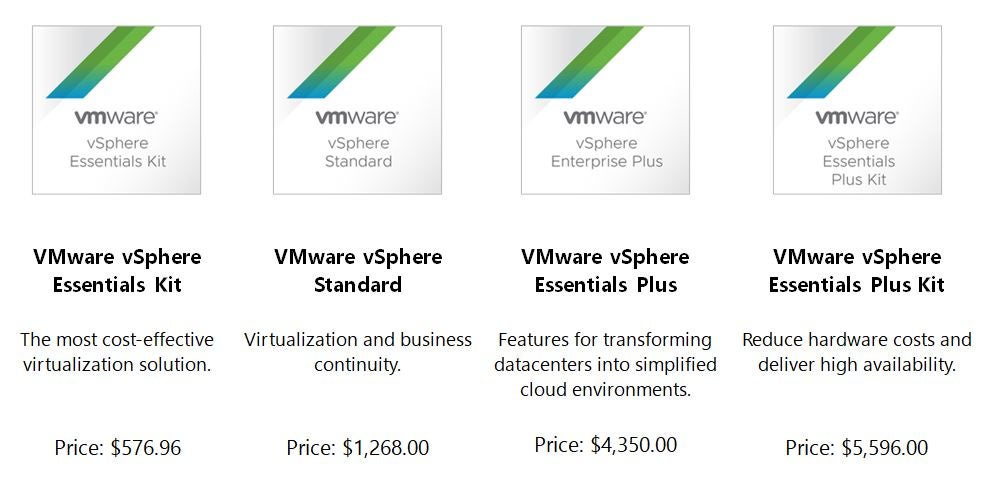![]() VMware vSphere is VMware’s virtualization platform, and vCenter and ESXi are both important components of vSphere. VMware vSphere, vCenter, and ESXi were initialized as different technologies for different purposes, but now they’re combined into the vSphere platform. In this article, we discuss vSphere, vCenter Server, ESXi, and the differences between them.
VMware vSphere is VMware’s virtualization platform, and vCenter and ESXi are both important components of vSphere. VMware vSphere, vCenter, and ESXi were initialized as different technologies for different purposes, but now they’re combined into the vSphere platform. In this article, we discuss vSphere, vCenter Server, ESXi, and the differences between them.
Read more: VirtualBox vs VMware: Choosing the Best Virtualization Tool
What Is vSphere?
vSphere is a cloud computing virtualization platform delivered by VMware. VMware vSphere is not a particular software, but rather a software package that has several sub-components.
vSphere encompasses several individual products and technologies to provide a complete infrastructure for virtualization. vSphere includes an updated version of vCenter Configuration Manager and Application Discovery Manager, as well as vMotion to move multiple virtual machines (VMs) at a time from one host server to another.
VMware vSphere is a software suite of virtualization solutions that has many software components such as vCenter, ESXi, vSphere client, and others. Purportedly, VMware vSphere 7, the latest release, combines with VMware Tanzu to enable IT administrators to get started with Kubernetes workloads within an hour.
Read more: VMware vSphere 7 Security & Features
VMware vSphere Use Cases:
- Artificial intelligence (AI) and machine learning (ML)
- Remote and branch offices (ROBO)
- Big Data and modern data applications
- High performance computing (HPC)
VMware vSphere Key Features:
- Tanzu Kubernetes Grid (TKG) Service
- Drop-in to existing infrastructure
- Application-focused management
- VM-ready AI
- Monster VMs (more than eight virtual CPUs (vCPUs) and more than 255 GB of virtual RAM)
- Persistent Memory (PMEM) workload resilience
- Lifecycle Manager (vLCM) enhancements
- vSphere Ideas
- vCenter Connect
Benefits of VMware vSphere:
- Providing business continuity and always-available IT
- Reducing IT footprint and simplifying management
- Saving on IT hardware costs
- Improving service levels and application quality
- Strengthening security and data protection
What Is vCenter Server?
vCenter Server is advanced server management software provided by VMware. vCenter Server provides a centralized platform for controlling vSphere environments, providing visibility across hybrid clouds. It allows the automation and delivery of virtual infrastructure.
VMware vCenter Server is a centralized management application that allows managing virtual machines and ESXi hosts. It is a necessary application for the users of VMware enterprise features like vMotion, VMware Update Manager, VMware High Availability, and others.
VMware vCenter Server Key Features:
- Simple deployment
- Extensibility and scalability across hybrid cloud
- Centralized control and visibility
- Proactive optimization
- Improved server management
- Plug-in extensibility
What Is ESXi?
VMware ESXi is an enterprise-class native hypervisor (type-1). ESXi is not just a software application; it also integrates vital operating system components. ESXi was previously known as ESX (Elastic Sky X). The replacement for ESX was internally called VMvisor, but later changed to ESXi, with the “i” standing for “integrated.”
VMware ESXi effectively partitions hardware to consolidate applications and reduce costs. It is an industry leader for efficient architecture, setting the standard for reliability, performance, and support when deploying and serving virtual computers. Customers can use ESXi with the free vSphere Hypervisor edition, or as part of a paid vSphere edition.
Read more: Proxmox vs ESXi: Choosing the Best Hypervisor
VMware ESXi Use Cases:
- Consolidate hardware for higher capacity utilization
- Increase performance for a competitive edge
- Streamline IT administration through centralized management
- Reduce CapEx and OpEx
- Minimize hardware resources needed to run the hypervisor, meaning greater efficiency
VMware ESXi Key Features:
- Small footprint (just 150MB)
- Reliable performance
- Enhanced security
- User-friendly experience
Differences Between vSphere vs vCenter vs ESXi
VMware vSphere, vCenter Server, and ESXi are the necessary parts to build VMware infrastructure. It is clear that vSphere, vCenter, and ESXi are related to each other, but they are different.
It is important to know the differences between vSphere, vCenter Server, and ESXi for a clear understanding of where and when each fits into the mix of VMware virtualization solutions.
| vSphere | vCenter | ESXi | |
|---|---|---|---|
| What it is | Virtualization platform delivered by VMware | Advanced server management software installed on a host machine (physical or virtual) | Virtualization software (Hypervisor) installed on a physical machine |
| What it provides | A complete infrastructure for virtualization | A centralized and extensible platform | Virtualization layer |
| What it's for | Modern applications using any combination of VMs, containers, and Kubernetes | Controlling VMware vSphere environments | Deploying and serving VMs |
| Allows IT teams to | Build a reliable and resilient infrastructure | Automate and deliver a virtual infrastructure across the hybrid cloud | Create and manage multiple VMs |
| Initial release | April 21, 2009 | December 5, 2003 | March 23, 2001 |
vSphere, vCenter, and ESXi were initialized at different times to provide different services for virtualizations, and then combined into a larger software suite. As such, VMware vSphere and its components deliver a more reliable and cost-effective solution.
“With rapid provisioning of servers through virtualization, we can now scale horizontally to handle those bursts, and we’ve been able to successfully handle surges,” says Bipin Jayaraj, CIO for Make-A-Wish America, which uses vSphere.
VMware vSphere offers several pricing models based on user requirements:
- VMware vSphere Essentials Plus Kit
- VMware vSphere Essentials Plus
- VMware vSphere Standard
- VMware vSphere Essentials Kit

Read next: Proxmox vs VMware Comparison

